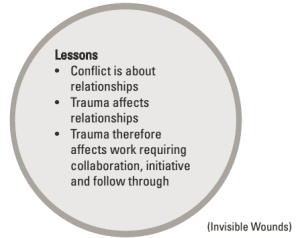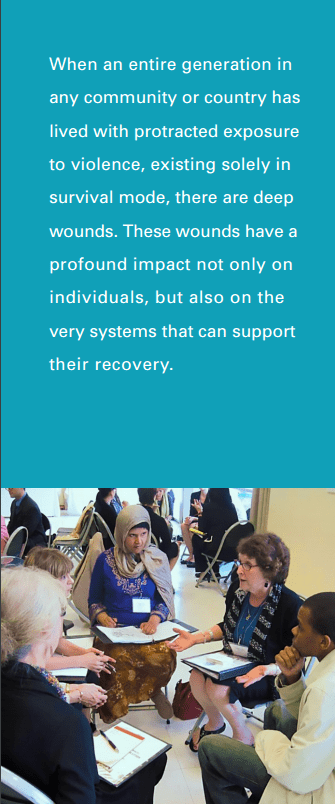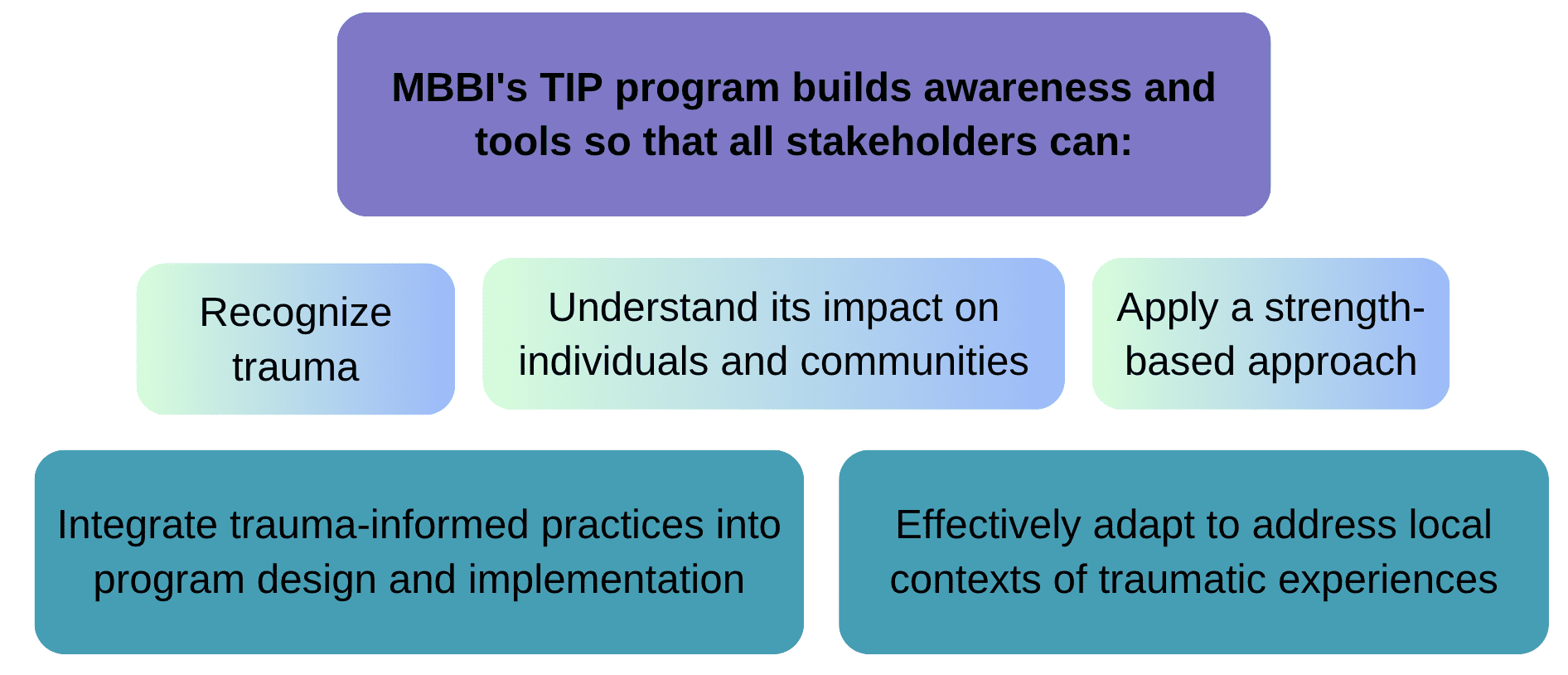
Trauma Stewardship calls on us to remember that it is a gift to be present when people deal with trauma; it reminds us of our responsibility to care and nurture our capacity to help.
(Dernoot Lipsky, 2009)

Trauma and violence represent a critical impediment to the building of sustainable peace. For if we do not attend to the wounds of the past, if we do not acknowledge the pain and suffering that have been experienced, then the seeds of future violence will remain firmly planted in the soil of the present.
(John Paul Lederach, 1997)
Trauma-Informed Peacebuilding
& Development Assistance
 Mediators Beyond Borders International’s Trauma-Informed Peacebuilding & Development Assistance (TIPDA) provides comprehensive training and consultation on the impact of primary and secondary trauma. Recognizing and addressing the effects of trauma results in more effective project design, leading to self-sustaining investment in livelihoods, partnerships, and peaceful resolution of conflicts. Our approach emphasizes inclusivity, cultural competency, and sensitivity to the impact of trauma on communities.
Mediators Beyond Borders International’s Trauma-Informed Peacebuilding & Development Assistance (TIPDA) provides comprehensive training and consultation on the impact of primary and secondary trauma. Recognizing and addressing the effects of trauma results in more effective project design, leading to self-sustaining investment in livelihoods, partnerships, and peaceful resolution of conflicts. Our approach emphasizes inclusivity, cultural competency, and sensitivity to the impact of trauma on communities.
TIPDA is built on a theoretical understanding of the neurobiology of trauma, current research, and extensive field experience. TIPDA is delivered by a multidisciplinary team which includes trauma specialists, peacebuilders, educators, development specialists, and clinicians. This theoretical basis guides MBBI’s belief that normalizing, validating and educating leaders, individuals and communities about the impact of exposure to trauma can remove a significant barrier to resolving conflicts peacefully, tapping a community’s resilience, and creating sustainable peace.
MBBI’s approach in all of its work, including TIPDA, combines theory and practice, learning concepts and incorporating that knowledge into the work participants are doing. Each program begins with a training that includes presentations, participatory exercises, case studies developed from the group’s context, and discussion. The training is followed by multiple coaching sessions as the participants work in their communities, organizations, or regions. During the coaching sessions, participants share experiences and jointly work through challenges they each face in incorporating a trauma-informed approach into their work.
We offer programs in trauma-informed practice for funders, multinational organizations, and practitioners in Healthcare, Education, Human Rights, Conservation, Mediation, and Humanitarian Aid. MBBI emphasizes trauma-informed practices in its conflict assessments, project planning and programming requirements, design, monitoring, and assessment, consulting and training services.


"Understanding the type of trauma experienced by a participant in a mediation or dialogue process helps to understand and predict how participants may behave, what thoughts, emotions, or experiences they may have. Such knowledge can be useful in the process of preparing for the dialogue. Such knowledge helps the mediator to respond in a timely and qualitative manner and to make the process as gentle and comfortable as possible for the participants and their feelings."
Ukraine Participant, 2022
"I continue to be a goodwill Ambassador for some of the processes and techniques you've shown us. I’ve shown colleagues techniques for calming, and validating emotions. I'm re-reading the training books to make sure I retain the details. It's so very useful. Critical really."
TIPDA Participant, 2016

Our TIPDA program involves training and coaching around incorporating the knowledge and skills into one’s work. We have done this in various places, such as:
- Sussex (UK) Mediation Alliance (SMA) (April 2023) - introductory Trauma-Informed Mediation workshop for SMA members
- National Association of Mediators of Ukraine (Fall 2022)
- MBBI’s Listening Circles (March/April 2022) - preparing MBBI members to facilitate listening circles for those affected by Russia’s invasion of Ukraine
- South Sudan (2018) - training for our South Sudan partner to incorporate trauma-sensitive approaches when defusing conflict
- USAID (2018) - training for USAID staff in South Sudan to apply trauma-informed practices to development program design and implementation
- MSI and USAID staff (2018) - Developing proactive approaches to supporting and managing staff in high risk environments
“I was previously aware of how people are unable to process properly when stressed but I think this has rammed it home! There is little point trying to get a party to look for solutions rationally when they are in a very emotional state. We need [to use techniques like] time out, soothing, etc until they calm down or we're wasting our time and potentially making matters worse. Also useful to be aware how the person themselves may not realise the state they are in.”
SMA Workshop Participant, 2023
MBBI incorporates trauma-informed awareness and tools into its projects and International Peace Training Institute cohorts:
- Kenya - Working with Interviewers to develop trauma-sensitive research questions while working within the conflicts between farmers and herders
- Liberia - Developing trauma awareness in communities rebuilding following the war
- Sierra Leone - Training healthcare providers to facilitate trauma-informed dialogues within communities ravaged by the Ebola crisis
- Women in Peacebuilding (WIP) - a module on trauma-informed peacebuilding is included in each cohort’s training
- ARCOM (African Rotary Community Mediation) - a module on trauma-informed peacebuilding is included in each cohort’s training
“I realize the need to work through my own trauma to be effective in dialogue with others.”
Ukraine Participant, 2022


 Want to Build Peace?
Want to Build Peace?